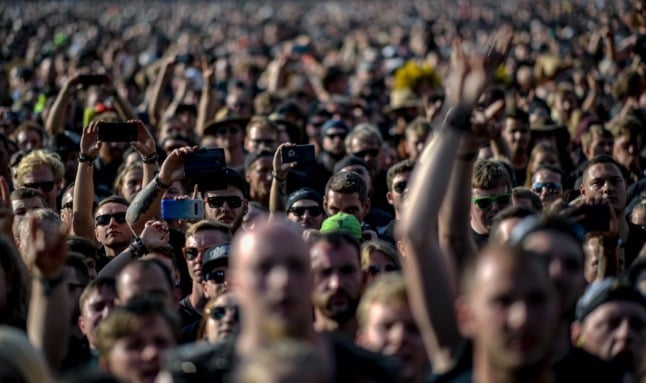Several festivals in Germany – from Wacken Open Air in Schleswig-Holstein to Munich’s world renowned Oktoberfest – have already been cancelled for this year.
And Wacken’s smaller event ‘Bullhead City’, which was due to take place in September with around 20,000 rock fans, was also axed earlier this week due to rising Covid numbers.
“In view of the current situation, a boisterous festival, as our fans deserve, is not conceivable due to the measures to be taken, which include, among other things, a mask obligation in almost all areas of the festival,” said organiser Holger Hübner.
Earlier this year and in 2020, the full version of the heavy metal festival, which sees about 75,000 fans come together, was cancelled because of the pandemic.
A whole host of other musicians such as Peter Maffay and Steven Wilson have also had to postpone their tours in Germany planned for autumn.
READ ALSO: Who’s affected most by Germany’s fourth Covid wave?
After the mess of 2020, organisers had been looking forward to a new start. But if the current development continues like this, Covid will once again throw a spanner in the works.
“As long as there are capacity restrictions and spacing rules, events don’t make economic sense,” Jens Michow, president of the Federal Association of the Concert and Event Industry, told DPA. He is calling for uniform rules for his industry nationwide.
What do concert and event organisers want to see?
Gig bosses see Hamburg’s decision to allow businesses to exclude unvaccinated people from venues (known as the 2G model rather than 3G) as the way forward.
“We hope that the Hamburg 2G model will be a blueprint for all other German states,” Michow said.
Under the 2G option, which will be offered in Hamburg from Saturday, promoters and businesses can decide whether to let in only the vaccinated and people who’ve recovered from Covid.
These events will then be largely exempt from following Covid restrictions like caps on the number of attendees.
Businesses and event organisers can, however, choose to allow unvaccinated people to enter if they show proof of a negative Covid test (this is the 3G rule), but the venue must then follow tougher restrictions.
EXPLAINED: These are Germany’s Covid hotspots
“Concert tours will not be possible again until there is no patchwork of different regulations in Germany, and the states finally agree on a uniform opening scenario,” Michow stressed.
Since PCR tests provide more reliable results than rapid tests, Michow also suggested that it should be possible to allow PCR-tested people to access events without capacity restrictions.
Dieter Semmelmann, managing director of Semmel Concerts, said: “Promoters are currently struggling with a federal mess of regulations that makes it almost impossible to stage nationwide tours.”
A major problem, he said, continues to be the different regulations of Covid protection measures and the associated opening restrictions or bans at the state level.
“We need a clear structure and planning security on the part of politics – at the federal level,” Semmelmann said.
He said he was open to the 2G model that excludes unvaccinated people.
Marek Lieberberg, managing director of Live Nation, is also in favour of this entry system.
“Hamburg has made a landmark, overdue decision with the 2G model, which must set a precedent so that modern culture can finally flourish again after its forced hiatus through no fault of its own,” Lieberberg said. In many countries, including the UK and the USA, live concerts are already possible again – mostly without restrictions, he added.
Peter Schwenkow, managing director of Deutsche Entertainment AG (DEAG), expects – after successful pilot events with the Berlin Philharmonic and the Potsdam Schlössernacht – permits to be granted again in autumn, and then concerts can get going again.
But international touring will have to wait until spring next year, he said.
Vocabulary
Organisers – (die) Veranstalter
Cancellation (die) Absage
Boisterous – ausgelassen
A spanner in the works – Sand ins Getriebe streuen (translated directly to sprinkling sand in the gearbox)
We’re aiming to help our readers improve their German by translating vocabulary from some of our news stories. Did you find this article useful? Let us know.



 Please whitelist us to continue reading.
Please whitelist us to continue reading.
Member comments